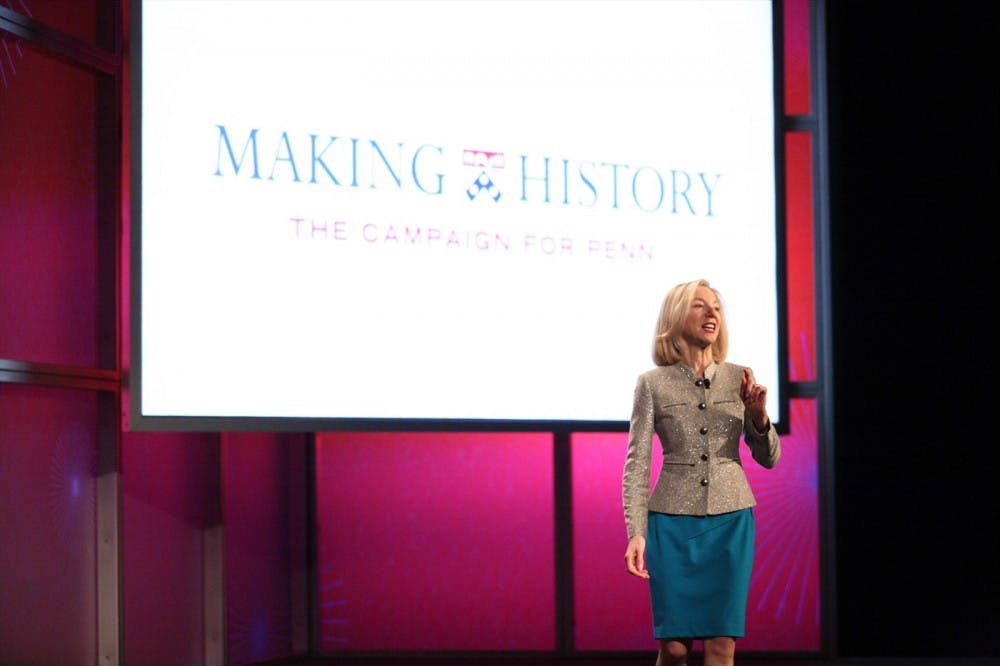From renting out the Philadelphia Museum of Art during New Student Orientation to developing new campuses in San Francisco and Beijing, Penn spends lavishly to maintain its reputation as one of this country’s most coveted Ivy League universities.
This money certainly doesn’t grow on trees.
Over 500 Penn employees come to work each day in Penn’s 17 development offices in order to raise money from students, parents, alumni and major donors so that Penn’s 22,000 students can receive world-renowned educations. They are succeeding at an unprecedented rate.
Penn’s fundraising efforts are among the best of U.S. universities, according to the results of a Council for Aid to Education survey released this January. With a record $484 million raised in 2014, Penn ranked eighth nationally in fundraising, behind schools including Harvard University, University of Southern California and the University of Texas at Austin.
Annual contributions to the University have grown by 109 percent since fiscal year 2010 when the University raised $231.5 million. Penn is positioned to raise even more money this coming year, Vice President of Finance and Treasurer Stephen Golding said.
Penn’s successes can be attributed in part to its traditional fundraising practices. Penn engages in direct mail initiatives, sends out mass emails and staffs phone banks in which volunteers cold-call parents and alumni to raise money for the University.
To court major donors, Penn’s Development Office has employees whose sole job is to serve as points of contact for wealthy alumni. These major gift officers develop relationships with major donors and, almost like stockbrokers, tip them off when there is an opportunity to give back to the University that meets their individual needs and objectives.
But Penn’s fundraising efforts reach far beyond these traditional means. The secret to Penn’s fundraising is its alumni engagement, which makes them more willing to donate to the University.
“[Our] strategy is to keep our alumni feeling connected, feeling like they’re a part of Penn and that Penn’s still a part of them,” Assistant Vice President for Alumni Relations Hoopes Wampler said. “It helps the institution in a lot of ways — one of which is that they’re more inclined to donate financially — but that’s not the only byproduct. “
Everything from the Alumni Interview Program to class reunions, Penn Alumni Regional Clubs and Penn’s alumni magazine The Pennsylvania Gazette are, in part, intended to develop a strong connection between Penn and its alumni and, in doing so, increase their willingness to donate. Penn even sends emails to alumni on their birthdays.
The key to Penn’s recent success is its strategy of shaping students into future donors before they even leave. Penn’s Office of Development and Alumni Relations now focuses on developing a strong connection between students and Penn while they are still on campus.
“If you can believe it, this thinking to engage students and young alumni is a relatively new mode of thinking in alumni relations and development because historically young alumni and students haven’t been able to give a lot of money back,” Wampler said. “We’ve been pretty progressive in that regard.”
Penn’s success has led Cornell and other universities to model their alumni relations campaigns on Penn’s strategy, Wampler said.
“We are one of the best alumni relations departments in the world,” Executive Director of Alumni Relations Elise Betz said. ‘We’ve been modeled all over the world for the work that we do.”
Alumni Relations’ Penn Traditions arm hosts class picnics and class pictures and contributes to the organization of PennFest, Skimmer Fest, Hey Day and other events that aim to cultivate a life-long connection with the University.
Through its Seniors For The Penn Fund initiative, seniors raise money from their classmates for the University. These donations help develop a philanthropic mindset among graduating classes and allow the Alumni Office to identify future donors and volunteers, Betz said.
In many ways, Penn’s overall fundraising strategy can be likened to Obama’s successful fundraising efforts during his 2008 and 2012 presidential campaigns.
Like Obama, Penn is focused on attracting small donations from many donors so that it can keep coming back to these donors for years to come. Penn also relies on grass-roots volunteer efforts to fundraise, much like the Obama campaigns. From class reunions to call banks, volunteers are essential in helping Penn fill its coffers.
Penn has succeeded in volunteer recruitment at an unprecedented rate. Between 2006 and 2012, the number of class reunion volunteers grew by 23.3 percent and the alumni participation in Career Services and career networking programs has increased 25 percent.
Alumni engagement is on the rise as well. Between 2006 and 2012, undergraduate reunion attendance was up 68 percent, the number of active regional Penn Clubs grew to 103 — currently 130 — and attendance at Homecoming and Alumni Weekend diversity events grew by 94 percent.
Alumni and students, however, aren’t the only constituent groups that give back to the University, Vice President for Development and Alumni Relations John Zeller said. “You have grateful patients, individuals who want to support research, grateful owners in the vet school who want to support research and patient care for animals, you have current and past parents, you have friends, corporations, and foundations, so it comes from a variety of sources.”
It’s no surprise, then, that Penn was able to raise $4.3 billion for its Making History campaign.
“Campaigns create urgency, they create a lot of momentum, you focus your priorities on specific items that you can articulate, you engage a lot of volunteers and people make bigger gifts. That’s what campaigns are designed to do,” Zeller said.
Penn’s current challenge is continuing to attract large donations now that the Making History campaign is over.
“Coming out of the campaign, one of our goals was to sustain the momentum we had throughout the campaign,” Zeller said. “At the same time, we are focusing on continuing that engagement with our alumni and constituents throughout the world.”
Related: Penn looks to sustain fundraising efforts



